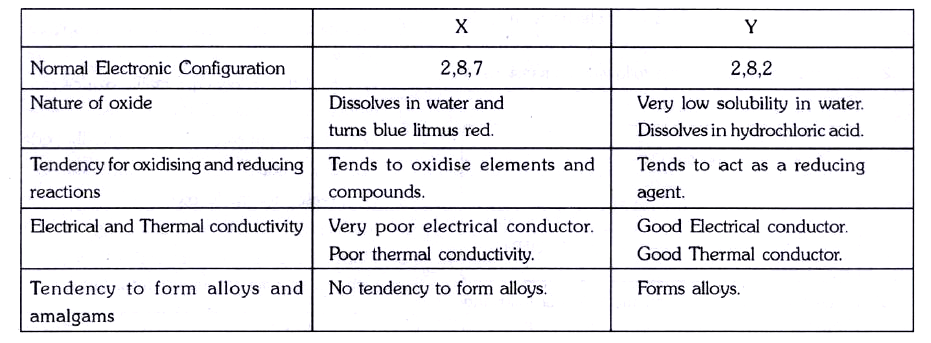Nitrogen comnines with metals to form
nitrites
nitrates
nitrosyl chloride
nitrides
The correct Answer is:D
To answer the question "Nitrogen combines with metals to form," we need to analyze the options given: nitrites, nitrates, nitrosyl chloride, and nitrides.
1. Understanding Nitrogen Compounds:
- Nitrogen can react with metals to form various compounds. The type of compound formed depends on the oxidation state of nitrogen and the metal involved.
2. Identifying the Options:
- Nitrites (NO2-): These are salts or esters of nitrous acid (HNO2) and typically involve nitrogen in a +3 oxidation state.
- Nitrates (NO3-): These are salts or esters of nitric acid (HNO3) and involve nitrogen in a +5 oxidation state.
- Nitrosyl Chloride (NOCl): This is a compound formed from nitrogen monoxide and chlorine, not directly from metals.
- Nitrides: These are compounds formed when nitrogen combines with metals, typically involving nitrogen in a -3 oxidation state.
3. Analyzing Metal-Nitrogen Reactions:
- When nitrogen reacts with metals, it typically forms nitrides. For example, magnesium (Mg) reacts with nitrogen (N2) to form magnesium nitride (Mg3N2).
4. Conclusion:
- Based on the analysis, when nitrogen combines with metals, it forms nitrides. Therefore, the correct answer to the question is nitrides.
Final Answer:
Nitrogen combines with metals to form nitrides.
---
- Nitrogen can react with metals to form various compounds. The type of compound formed depends on the oxidation state of nitrogen and the metal involved.
- Nitrites (NO2-): These are salts or esters of nitrous acid (HNO2) and typically involve nitrogen in a +3 oxidation state.
- Nitrates (NO3-): These are salts or esters of nitric acid (HNO3) and involve nitrogen in a +5 oxidation state.
- Nitrosyl Chloride (NOCl): This is a compound formed from nitrogen monoxide and chlorine, not directly from metals.
- Nitrides: These are compounds formed when nitrogen combines with metals, typically involving nitrogen in a -3 oxidation state.
- When nitrogen reacts with metals, it typically forms nitrides. For example, magnesium (Mg) reacts with nitrogen (N2) to form magnesium nitride (Mg3N2).
- Based on the analysis, when nitrogen combines with metals, it forms nitrides. Therefore, the correct answer to the question is nitrides.
Nitrogen combines with metals to form nitrides.
Topper's Solved these Questions
- THE P-BLOCK ELEMENTS BOOK - NCERT FINGERTPS ENGLISHCHAPTER - THE P-BLOCK ELEMENTS EXERCISE - HOTS
7 Videos
- THE P-BLOCK ELEMENTS BOOK - NCERT FINGERTPS ENGLISHCHAPTER - THE P-BLOCK ELEMENTS EXERCISE - EXAMPLAR PROBLEMS
25 Videos
- THE D- AND F- BLOCK ELEMENTS BOOK - NCERT FINGERTPS ENGLISHCHAPTER - THE D- AND F- BLOCK ELEMENTS EXERCISE - Assertion And Reason
15 Videos
- THE SOLID STATE BOOK - NCERT FINGERTPS ENGLISHCHAPTER - THE SOLID STATE EXERCISE - Assertion And Reason
15 Videos
Similar Questions
Oxides of sulphur and nitrogen combine with rain water form.......and.......which cause.........
View SolutionHydrogen reacts with strong metals to form metal hydrides.
View SolutionHydrogen combines with nitrogen to form _____ in the presence of iron as a catalyst at a high pressure and temperature
View SolutionMetals react with non-metals to form stable compounds called ______ compounds.
View Solution
Using the information above, complete the following:
Non-metallic elements tend to form .......... oxides while metals tend to form ...... oxides.
View SolutionNitrogen forms pentahalides.
View SolutionIn dumas method for the estimation of nitrogen in an organic compound,nitrogen is determined in the form of:
View SolutionMost of the plants obtain nitrogen from the soil in the form of
View SolutionMost of the plants obtain nitrogen from the soil in the form of
View SolutionThe nitrogen compound that is formed when NH4Cl reacts with sodium hydroxide is
View Solution
